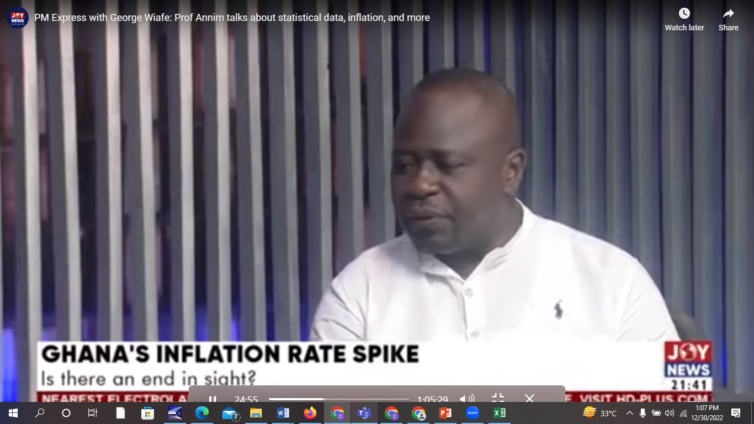Government Statistician, Professor Samuel Kobina Annim, says he cannot tell whether inflation has peaked or not.
Speaking on PM Express Business Edition, he said, it is only the historical data that can tell whether inflation has reached its highest limit.
“It’s a conversation everyone wants to have, whether we’ve peaked or not. Anytime we do the release, we get journalists asking these questions. Again, it’s not in my place to say yes or no. Just for three or four reasons anytime you want to talk about we’ve peaked, you need to ask yourself what does the historical data suggest?”
“We do it for internal purposes with a lot of caution based on what I said to you earlier, having seen a 9.9% jump [November inflation to 50.3%], I’ll be hesitant in saying that we’ve exhausted all the pass-through effects. This is exactly what I am saying”, he explained.
Continuing, Professor Annim also said despite the cedi gaining some grounds to the dollar in the month of December 2022, it does not mean inflation will come down in the month under review.
Improved cedi value does not translate into immediate fall in inflation
“I’ve heard people talking about why inflation is still going up when the exchange rate has slowed down. This is exactly what I tried explaining to you. If the cedi appreciates as we saw, it doesn’t automatically translate into the sellers bringing down the prices. It takes time for that to happen and that is what we mean by the pass-through effect and the other dimension is the multiple pass-throughs”.
Again, he said, “it takes time, and the other one is if the exchange rate drops, which commodities are affected and what are the weights of these commodities? When you have more than one item having an effect on the exchange rate, it gets complicated because you cannot exhaust the pass through effect from only the ‘spare parts’ point of view. If diesel [price] drops, you don’t expect only ‘trotro’ fares to automatically go down”.
Inflation hit 50.3% in November 2022, the biggest jump since the year 2000.
This was as a result of a significant increase in transport fares, utility tariffs and the exchange rate fluctuation.
Latest Stories
-
Paris 2024: Opening ceremony showcases grandiose celebration of French culture and diversity
3 hours -
Spectacular photos from the Paris 2024 opening ceremony
4 hours -
How decline of Indian vultures led to 500,000 human deaths
4 hours -
Paris 2024: Ghana rocks ‘fabulous fugu’ at olympics opening ceremony
4 hours -
Trust Hospital faces financial strain with rising debt levels – Auditor-General’s report
5 hours -
Electrochem lease: Allocate portions of land to Songor people – Resident demand
5 hours -
82 widows receive financial aid from Chayil Foundation
5 hours -
The silent struggles: Female journalists grapple with Ghana’s high cost of living
5 hours -
BoG yet to make any payment to Service Ghana Auto Group
5 hours -
‘Crushed Young’: The Multimedia Group, JL Properties surprise accident victim’s family with fully-furnished apartment
6 hours -
Asante Kotoko needs structure that would outlive any administration – Opoku Nti
6 hours -
JoyNews exposé on Customs officials demanding bribes airs on July 29
7 hours -
JoyNews Impact Maker Awardee ships first consignment of honey from Kwahu Afram Plains
8 hours -
Joint committee under fire over report on salt mining lease granted Electrochem
8 hours -
Life Lounge with Edem Knight-Tay: Don’t be beaten the third time
8 hours

